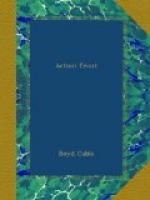By now the whole line had caught the alarm; the rifle fire had swelled to a crackling roar, the bullets were whistling and storming across the open. In desperate haste they threw themselves down and wriggled under the wire, and as they did so they felt the earth beneath them jar and quiver, heard a double and triple roar from behind them, saw the wet ground in front of them and the wires overhead glow for an instant with rosy light as the fire of the explosion flamed upwards from the crater.
At the crashing blast of the discharge, the rifle fire was hushed for a moment; Ainsley saw the chance and shouted to his men, and, as they scrambled clear of the wire, they jumped to their feet, rushed back over the flat, and dropped panting in the shelter of the ditch. The rifle fire opened again more heavily than ever, and the bullets were hailing and splashing and thudding into the wet earth around them, but the bank protected them well, and they took the fullest advantage of its cover. Because the depression they were in shallowed and afforded less cover as it ran towards the British lines, it was safer for the party to stay where they were until the fire slackened enough to give them a fair sporting chance of crawling back in safety.
They lay there for fully two hours before Ainsley considered it safe enough to move. They were, of course, long since wet through, and by now were chilled and numbed to the bone. Two of the men had been wounded, but only very slightly in clean flesh wounds: one through the arm and one in the flesh over the upper ribs. Ainsley himself bandaged both men as well as he could in the darkness and the cramped position necessary to keep below the level of the flying ballets, and both men, when he had finished, assured him that they were quite comfortable and entirely free from pain. Ainsley doubted this, and because of it was the more impatient to get back to their own lines; but he restrained his impatience, lest it should result in any of his party suffering another and more serious wound. At last the rifle fire had died down to about the normal night rate, had indeed dropped at the finish so rapidly in the space of two or three minutes that Ainsley concluded fresh orders for the slower rate must have been passed along the German lines. He gave the word, and they began to creep slowly back, moving again only when no lights were burning.
There were some gaspings and groanings as the men commenced to move their stiffened limbs.
“I never knew,” gasped one, “as I’d so many joints in my backbone, and that each one of them could hold so many aches.”
“Same like!” said another. “If you’ll listen, you can hear my knees and hips creaking like the rusty hinges of an old barn-door.”
Although the men spoke in low tones, Ainsley whispered a stern command for silence.
“We’re not so far away,” he said, “but that a voice might carry; and you can bet they’re jumpy enough for the rest of the night to shoot at the shadow of a whisper. Now come along, and keep low, and drop the instant a light flares.”




